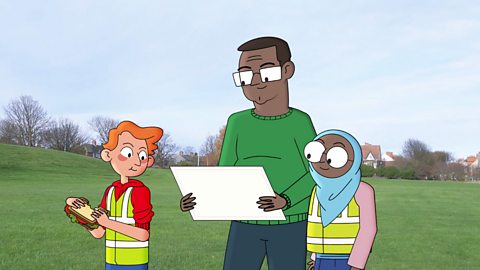What do you need to think about?
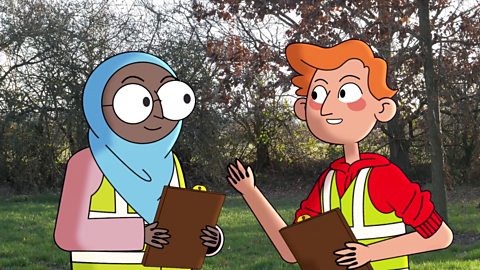
To help you find out the best way of carrying out your investigation, you need to think about:
- what you want to find out
- what type of questions you will ask
- what type of data you will collect

Fieldwork questions
To find out peopleâs views during your fieldwork, you need to think of what types of questions to ask.
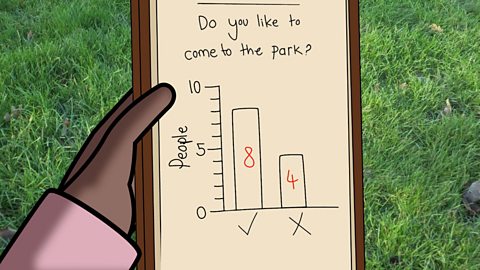
Closed questions
These are where the answer is either yes or no, such as:
- Do you like to come to the park?
- Do you think dogs should be allowed in the park?
The data you get from closed questions is called quantitative data because you can count the number, or quantity of people who have answered âyesâ and ânoâ. This kind of data is easy to make into a graph.
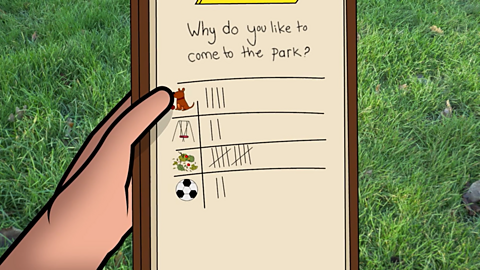
Open questions
These are where the answer could be anything, such as:
- What do you like best about the park?
- Why do you like to come to the park?

The data you get from open questions is called qualitative data because it is measured by the quality, not the quantity.
This type of data is hard to make into a graph, unless you make a list of answers to choose from.
Watch: Researching fieldwork
Play the video to watch Ayesha and James visit a park to research their fieldwork investigation.
James: Ayesha, have you chosen what you want to find out during our visit?
Ayesha: There are so many things that I want to know! I could ask people if they enjoy coming to the park. If they think it's a nice place to be. Or if they would like to come to the park more often.
James: I suppose all the answers to those questions will be either 'yes' or 'no'. Like, 'Yes the park is a nice place to be'. Or, 'No, I don't enjoy coming to the park'.
Ayesha: Exactly! They're closed questions. That's when people have a list of answers to choose from.
James: I was going to ask people why they like coming to the park. You can't answer 'yes' or 'no' to that though, because there will be lots of different answers.
Ayesha: So it's an open question because that answer could be anything. For example: 'I like playing football'. Or 'I like to sit and read'.
James: You can count your 'yes' and 'no' answers. Just like I'm counting the number of spiders crawling up your leg!
Ayesha: Oh. What!?
James: Just kiddingâŠ
Ayesha: Phew!
James: My answers are going to be hard to count though.
Ayesha: My answers are easy to count. So it's simpler for me to create my graphs.The numbers I'll be collecting are called 'quantitative' data.
James: My data will be 'qualitative', which means it's tricky to count because there could be loads of different opinions as answers.
Ayesha: Hmm, that's going to be tricky to show in a graph, isn't it?
James: I could make it easier if I give people a list of answers to choose from.
Ayesha: Or you could draw a picture of all the things people like, or do some creative writing.
James: Whatever we do, we must stay safe. We should make sure we're always with the group in the park, and away from the road.
Ayesha: Yeah, it's important to think about the risks when you're out and about!Watch out!
James: Oh!
Fieldwork tips

Image caption, Planning your research
If you want to present your data in a table or graph you need to think of the types of questions you will ask.
Image caption, Researching your investigation
Remember the types of questions you could ask people â open or closed.
Image caption, Closed questions
Closed questions need a âyesâ or ânoâ answer.
Image caption, Open questions
It's easier to make a chart if you write a list of answers for people to choose from.
Image caption, Data
Think about how you'll show your data so that it's easy to understand.
Image caption, Staying safe
Always stay safe during fieldwork. Keep away from the road and stay with the group.
1 of 6
Watch: What unique features do you have in your area?
What would you choose to show someone if you were giving them a tour? Fieldwork can help you explore some important local features and landmarks but what would yours be?
In this Âé¶čÔŒĆÄ Teach video we meet Zoe from Hamburg, Germany who give us a tour of her unique places.
Activities
Activity 1: Wildlife fieldwork
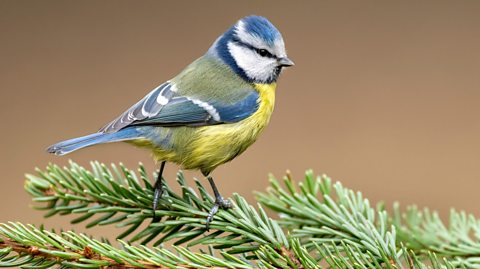
What wildlife do you have in and around your school or local park?
Carry out an investigation about the wildlife in a green space near you.
You could:
- count how many different animals you see
- record where you see animals eg in a tree, near water
- listen to any sounds animals make
- find out more about looking for wildlife in your local space in this Regenerators guide
Activity 2: Quiz â Researching fieldwork
Bitesize Primary games. gameBitesize Primary games
Play fun and educational primary games in science, maths, English, history, geography, art, computing and modern languages.

More on Fieldwork
Find out more by working through a topic
- count4 of 12
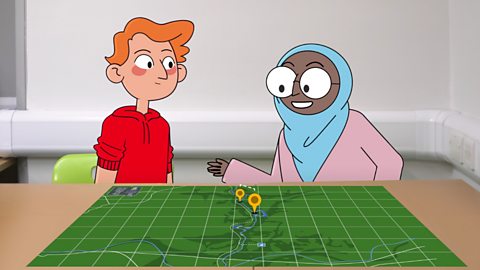
- count7 of 12
